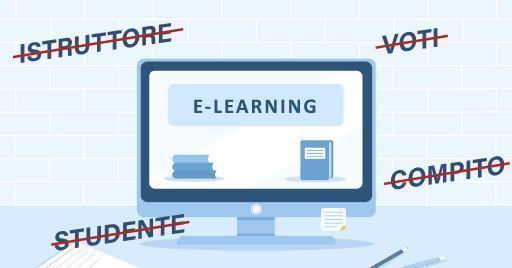

Presentation of an eLearning course: words to avoid
Discover how to effectively use words when presenting an eLearning course designed for adults.
Presentation of an eLearning course: words to avoid
Discover how to effectively use words when presenting an eLearning course designed for adults.
ELearning is synonymous with education. Often, we tend to associate this term with the academic or, at most, university environment. However, in recent years, online learning has also permeated the professional and corporate landscape. Many companies now offer learning opportunities to their employees, enabling them to stay updated and well-prepared for their roles and responsibilities.
Corporate eLearning has experienced a boom in recent years, partly due to the needs arising from the Covid-19 pandemic. This crisis compelled companies to find alternative methods to traditional training. Consequently, the internet has become the preferred platform for providing professional learning tailored to different job roles. From in-person meetings, the shift has been towards online meetings, and from physically organized training sessions, there is a preference for digital lessons. This shift is attributed to the digital realm offering greater autonomy and flexibility, allowing employees to manage their learning time as they prefer, free from time and location constraints.
Undoubtedly, eLearning can provide numerous benefits in the professional realm, prompting an increasing number of companies to turn to online learning methods to train their workforce.
However, to ensure the success of an eLearning course and achieve desired objectives, careful attention must be paid to the ideation and planning of lessons, particularly regarding the words used to present the course. Some terms, in fact, may discourage potential participants from enrolling.
Words to avoid
To make an online course effective, it is crucial to meticulously craft the course presentation. The more appealing the showcase, the greater the chance of attracting participants. Hence, words play a pivotal role and should not be used arbitrarily, especially in the context of professional training for adults who have no intention of feeling like they are back in school during eLearning sessions.
Here are words that are better to avoid in an online professional training course:
- Instructor or teacher. These terms are associated with contexts entirely different from eLearning in the business world. These words are more aligned with practical and theoretical school teaching. An adult looking to enhance their professional skills is unlikely to view favorably someone presented as a "teacher," implying a position of superiority. It is better to use more generic terms such as guide, presenter, or subject matter expert.
- Student. This term identifies a student participating in school lessons, not an adult taking an online course. Using the word "student" could emphasize a detachment between the course guide and the participant, implying an inferior position for the latter. Instead, use the word "participant," which does not carry any negative connotations for eLearning users.
- Grades. Evaluation can be intimidating, not just for school students but also for adults facing workplace challenges. Therefore, it is not advisable to include grades and assessments in online courses dedicated to professional training, as they may deter potential participants. To monitor user progress, consider incorporating quizzes or point-based games, allowing participants to assess their learning without the anxiety of grading.
- Assignment. To avoid participants feeling like they are back in a school setting, it is advisable not to use the term "assignment." This word belongs to a vocabulary that poorly aligns with the work environment. Instead, use terms like projects or activities in an online course, allowing participants to work individually or in groups without any reference to homework assignments.
Avoiding these words can make professional training more streamlined and well-received by workers, simplifying and consequently enhancing the learning experience